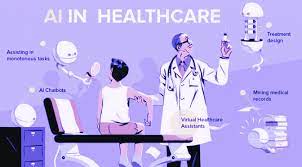10 AI Healthcare Trends Shaping the Future (2025 & Beyond)
Artificial intelligence is transforming healthcare at an unprecedented pace. With a projected 49% CAGR through 2030 (MarketsandMarkets) and generative AI accelerating innovation, hospitals, clinics, and insurers are integrating AI into clinical workflows, diagnostics, and operations.
Here are the 10 biggest AI healthcare trends to watch:
1. AI Chatbots for Patient Engagement
- Automate intake, scheduling, and billing
- Triage symptoms (e.g., WebMD’s AI nurse)
- Multilingual patient education
“AI chatbots cut our call center volume by 30% while improving response times.” —Jordan Archer, COO, Tryon Medical Partners
2. AI-Powered Clinical Documentation
- Voice-to-text ambient scribes (e.g., Nuance DAX)
- Auto-generated visit summaries & discharge notes
- 25% of PCPs now use AI for EHR tasks (Rock Health)
3. Unstructured Data Analysis
- 80% of medical data is unstructured (scans, notes, genomic data)
- AI extracts insights from MRIs, lab reports, and doctor’s notes
- Predicts sepsis, drug interactions, and high-risk patients
4. AI Radiology & Imaging Assistants
- Detect tumors, fractures, and anomalies faster
- Prioritize urgent cases (e.g., stroke detection)
- Reduces radiologist workload by 30% (JAMA Study)
5. Robotic Surgery & Automation
- AI-guided precision in minimally invasive procedures
- Autonomous suturing & incision assistance (ACS)
- Faster recovery, fewer complications
6. AI in Physical Therapy
- Personalized rehab plans via motion-tracking wearables
- VR-guided exercises with real-time feedback
- Improves adherence & outcomes
7. AI-Generated Fitness & Wellness Plans
- Custom workouts based on health data
- Wearable integration (Apple Watch, Whoop)
- Supplemental tool—not a replacement for PTs
8. Automated Revenue Cycle Management
- AI reduces claim denials by 50%+
- Auto-prior authorizations (90%+ accuracy at Tryon Medical)
- Cuts billing delays & admin costs
9. Predictive Supply Chain Optimization
- AI forecasts vaccine & medication demand
- Reduces waste (expired drugs, overstocking)
- Tracks reliable suppliers
10. AI-Driven Business Strategy
- Market analysis for service line expansion
- Identifies referral patterns & patient needs
- Optimizes hospital catchment areas
Challenges: Equity & Adoption
While AI offers immense potential, smaller clinics and rural hospitals risk falling behind due to:
- Lack of AI governance
- Limited technical expertise
- High implementation costs
“We must ensure equitable access—AI shouldn’t just benefit large health systems.” —Dr. Margaret Lozovatsky, AMA
The Future of AI in Healthcare
✅ 2025-2030: AI becomes standard in EHRs, diagnostics, and surgery
✅ Generative AI drafts treatment plans, research papers, and insurance appeals
✅ Regulatory frameworks evolve to ensure safety & fairness
Bottom Line: AI isn’t replacing doctors—it’s empowering them to work smarter, faster, and more precisely.
Which trend will impact your organization most?
🔔🔔 Follow us on LinkedIn 🔔🔔













